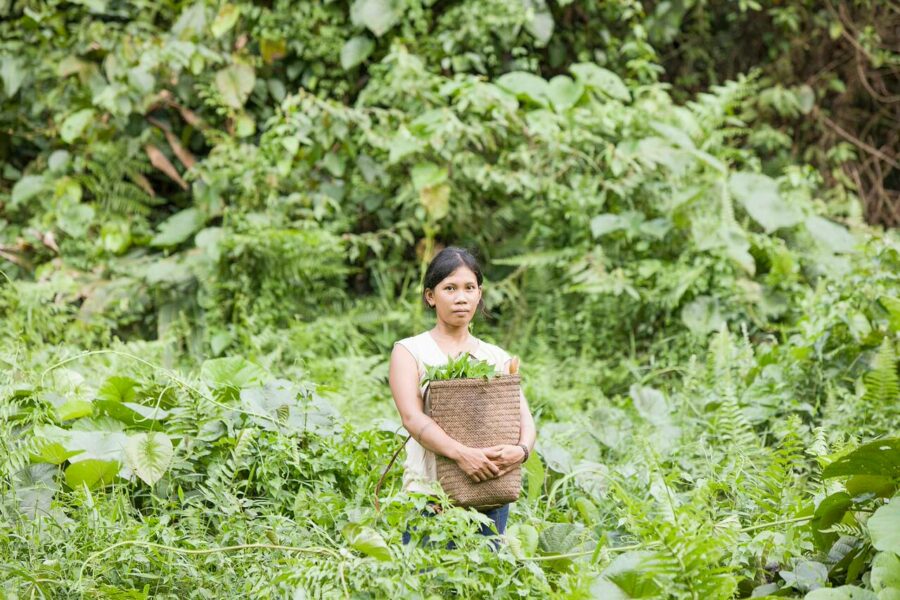Over half the world’s land is lived on and managed using customary and traditional systems. Yet indigenous peoples and local communities have formal, legal ownership of just 10 percent of land globally. Insecure land rights can often lead to protracted conflicts with governments and companies, climate change — when land is not protected from deforestation — and human rights abuses.
Millions of people live in the world’s remaining forests, and evidence is mounting that indigenous communities are not only the best managers of the land, but are indispensable allies in the climate fight.
A new $100 million initiative will help indigenous peoples and local communities in rural areas secure rights to their traditional lands.
“Include us, so that we can protect our lands for our children and protect the planet’s biodiversity for all the world’s children,” said by Victoria Tauli-Corpuz, UN Special Rapporteur on the Rights of Indigenous Peoples during the launch. Recognising the land rights of native and traditional peoples is a low-cost solution toward achieving the world’s development, environment and climate agendas.
For most people, the mega-hurricanes we have witnessed – along with their devastating consequences – have put an exclamation point on the urgency of climate change. But an even bigger exclamation point came in the form of a new scientific study showing how the carbon released by tropical deforestation and degradation has been underestimated.
Here are some of the terms frequently used in connection with indigenous and community lands.
A drive for a fairer world has to be at the heart of the fight for indigenous and communal land rights to ensure a long-term solution rather than just throwing money at the problem, the head of one of the largest U.S. philanthropic foundations said.
Por cada problema, una solución. Y una, a ser posible, que se pueda replicar en otra parte del mundo y sirva de la misma ayuda….
More than half of land rights conflicts in the developing world are not resolved, pitting companies, governments and businesses against indigenous communities, according to research published at the conference.
Here are the views of 10 experts interviewed by the Thomson Reuters Foundation during the two-day conference on the role of local communities, technology and business in ensuring secure land rights.
More than half of land rights conflicts in the developing world have not been resolved, pitting companies, governments and businesses against indigenous communities, researchers said on Tuesday.
The International Land and Forest Tenure Facility – the first and only global institution dedicated to securing the land rights of indigenous communities worldwide – was formally launched in Stockholm on Tuesday (Oct 3).
Businesses in Southeast Asia are increasingly counting the cost of land grabs, more than half of which result in delayed projects and nearly three-quarters of which lead to lawsuits, according to a wide-ranging research report.
The Sustainable Development Goals aspire to “leave no one behind.” If the international community is to succeed in this aim, it must address the grinding poverty, hunger, and despair that still plague many of the world’s forests and rural areas.
El Fondo internacional sobre tenencia de la tierra y los bosques fue presentado hoy de forma oficial en Estocolmo con el objetivo de promover los derechos colectivos…
In December 2015, world leaders signed onto the Paris Climate Agreement and committed to reducing greenhouse gas emissions to avoid the dangerous consequences of global warming. But with the United States’ recent decision to pull out of the landmark agreement, concerns for the fate of the planet, and quality of life on it, have only intensified.
In low- and middle-income countries, the vast majority of land remains contested, leaving around 2.5 billion people living in rural and forest areas highly vulnerable to poverty, violence…
Governments too often sidestep indigenous people when approving new infrastructure projects on their land, ignoring the potential for sustainable economic growth and environmentally-friendly development, a U.N. expert said on Tuesday.
Interview with UN Special Rapporteur Victoria Tauli-Corpuz to mark the International Day of the World’s Indigenous Peoples
Millions of tribal people in India are being denied their rights to forest land and resources and forced from their ancestral settlements due to a recently enacted law promoting an increase in tree cover, an indigenous rights group said on Wednesday.
Inadequate rights for indigenous and rural women are jeopardizing forests and common lands across the globe as demand for land and resources grows.
Women living in forest communities play a crucial role in climate change mitigation and economic development in low- and middle-income countries.
Como se ve en Mongabay el 26 de Abril, 2017 Doña Neria, del campamento El Chiclero, está contenta. Es la primera vez que un grupo…
Le jeudi, 9 février dernier, l’organisation Rights and Resources Initiative (RRI) a présenté à Dakar au Sénégal son rapport annuel 2016 – 2017 sur l’état…


